
UNIVERSITY OF OSLO | NORWAY
- Problemveien 7, 0315 Oslo, Norway
- Visit University Websites
- University Type: Public
- Famous For : Research oriented teaching




The University of Oslo is a public university founded in 1811 and located in the Norwegian capital of Oslo. The College is Norway’s oldest University, and it was the largest Norwegian institution of higher learning in terms of size until 2016. The University of Oslo has over 28,000 students, including a diverse population studying single men and aces programs. There are over 6,000 faculty members at the University. We provide information to students about the Norwegian capital, the Norwegian living cost, the Norwegian food cost, the Norwegian laundry cost, the Norwegian study visa cost, the Norwegian bank statement, the Norwegian financial statement for admission, the Norwegian student admission requirement, and so on.
It offers students scholarship opportunities based on academic excellence. There are four libraries at the University: the Library of Medicine and Health Science, the Library of Humanities and Social Sciences, the Faculty of Law Library, and the Faculty of Mathematics and Natural Sciences Library, as well as five museums: the Mineralogical-geological Museum, the Paleontological Museum, the Zoological Museum, the Botanical Garden, and the Botanical Museum. Norway student visa from Bangladesh is provided by Shopnotour for Students.
Gro Harlem Brundtland (former Norwegian Prime Minister), Ase Kleveland (Norwegian singer and politician), and Andreas Thorud (footballer)
Learn from Norway’s top researchers as a student at UiO.
Students have access to excellent lecture halls and university libraries.
In Oslo, you can live in the city with easy access to the great outdoors.
Choose from over 50 English-taught Master’s programs. Total Faculty: Law, Medicine, Humanities, Mathematics, Natural Sciences, Social Sciences, Dentistry, and Education.
Tuition fees for postgraduate students range from: It is open to all nationalists.
Valid travel documentation (Passport)
Curriculum Vitae (CV) (Detail Address, Phone Number, Email & Skype ID)
Two reliable references with email and phone numbers
SSC and HSC grades are 75%.
The Bachelor’s above Degree resulted in a mark of 75%.
Certificate of English Proficiency (IELTS 6.5 or above or TOEFL 554 or above)
Statement of Purpose/Motivational Letter Work Experience (If Available)
Admission 20,000/=
Contact Us
Shopno Tour
01958553912-4
Studying abroad offers several benefits, including exposure to new cultures and ways of thinking, the opportunity to learn a new language, the chance to gain international experience and make global connections, and the potential to boost your career prospects.
The admission requirements for studying abroad vary depending on the country and the institution you are applying to. Generally, you will need to provide academic transcripts, proof of English language proficiency (such as TOEFL or IELTS scores), letters of recommendation, and a personal statement or essay.
When choosing a study abroad program, consider factors such as the location, academic reputation of the institution, program offerings, cost, and support services available to international students.
The process for applying for a student visa varies depending on the country you are applying to. Generally, you will need to provide proof of admission to a recognized educational institution, evidence of financial support, and a valid passport. You may also need to attend an interview at the consulate or embassy.
Studying abroad can be expensive, but there are several options for financing your education, including scholarships, grants, student loans, and part-time work. It is important to research and apply for funding opportunities early in the application process.
To prepare for studying abroad, make sure you have all the necessary documentation, including a valid passport and student visa. Research the culture and customs of the country you will be visiting, and consider learning some of the local language. Connect with other students who will be studying abroad to build a support network, and make sure you have sufficient funds to cover your living expenses.
The process for finding housing while studying abroad varies depending on the country and the institution you are attending. Many institutions offer on-campus housing options, while others may provide assistance in finding off-campus accommodations. It is important to research your options and make arrangements well in advance of your departure.
Many institutions provide support services to international students, such as language classes, cultural activities, academic advising, and counseling services. It is important to take advantage of these resources to help you adjust to your new environment and succeed academically.
